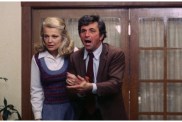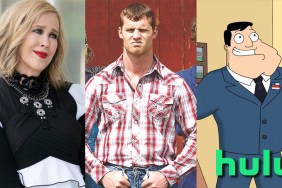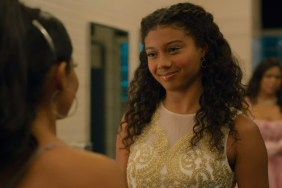
Attack the Block is a film sold with the tagline “Inner City vs. Outer Space” as aliens have landed in South London and for some reason seem attracted to one specific South London apartment building. Even more specifically, they seem to be honing in one group of young thugs, whom we first meet as they are mugging a nurse as she’s walking home. As terror rains down from the stars this group of misfits and the woman they mugged must ultimately work together to save their tower block from the alien marauders. But while Attack the Block is being sold as a sci-fi comedy, there’s a lot more to it than just that.
John Boyega stars as Moses, the leader of this gang with a not-so-ironic name. On top of serving as the face of this young group of hoods, Boyega makes his feature film debut in a role that gives him a chance to spread his acting wings. From an action star to a lonely and ignored inner city youth, John explores the gamut of emotions in a role that should serve as a good jumping off point to what may end up being a very fruitful career.
Behind the camera and the pages of this story is first time feature writer and director Joe Cornish who made a name for himself as a film critic for the BBC for six months, as well as co-host of the BBC comedy radio show “The Adam and Joe Show” and recently as a screenwriter working side-by-side with Edgar Wright (Shaun of the Dead, Scott Pilgrim vs. the World) on Steven Spielberg’s The Adventures of Tintin and the proposed Ant-Man feature based on the Marvel Comics character of which Edgar Wright plans on directing should the script ever get greenlit.
So Attack the Block will serve as Joe’s introduction and if you’ve been paying attention to what I’ve been writing on this site, it is one hell of an introduction. The film debuted at the South by Southwest Film Festival in March to glowing reviews and my own review was no less congratulatory. Attack the Block is set to open tomorrow, July 29, in Los Angeles, New York, Toronto, San Francisco, Seattle, Austin and Chicago before expanding nationwide.
So how about before you go shuffling off to the theater, or demanding your local theater owner get it in their theater, read my chat with Joe Cornish and John Boyega and learn just what exactly makes this such a worthwhile trip to the cinema. Let’s begin…
Without spoiling anything, at the end of the film there’s an English flag that plays a role in the finale. I bring it up because one theme in the film is the fact the country has basically ignored the people, the kids specifically, living in South London and so I felt its placement couldn’t possibly be a positive one.
Joe Cornish (JC): Well, the film is satirical and it’s intended to be ambiguous. That’s what I like in films. I like for there to be a question mark so the audience has to interpret for themselves a bit. And that’s reflected in Moses’ character as it’s presented in the movie. He starts out as a bad kid and then he realizes the consequences of his actions and he has an opportunity to redeem himself, but it’s subtly done. It’s not cheesy, there aren’t huge reveals.
I think that’s why it works so well. While it is a big action, comedy, sci-fi thriller… it’s also a genuine film about character. And John you get to turn in a real performance, not just the kid up against the aliens. Is that what drew you to the character?
John Boyega (JB): I was drawn to the character just by how much fun I was going to have and how authentic and great the story was. Like, we’ve seen a lot of urban films back in London, but we’ve never had a film that gives you that Hollywood, orchestra music, epic shots of where I live — which is South London. That, to me, made me fall in love with it. I was like, ‘This guy is not only making an urban film that’s so authentic, but he’s putting aliens in it and he’s making it cinematic at the same time.’
John, you’re from South London and from what I understand a lot of the slang is from South London. Do you use this language on a regular basis or was there a learning curve for you as well?
JB: It changes, when you’re with your boys, there are certain things you want to explain, but you have to explain it in the hood language for them to get it. It’s not only the meaning to words, it’s not like “this means this” and “this means that”, it’s just a mental connection. We got that with all of us on the set and even Joe would be like, ‘Okay fam,’ and —
JC: Did I say ‘fam’? Oh dear, I made an effort not to start talking like that. But so many people talk like that in the UK. It’s all over London, it’s every city, and basically if you’re under 25, and maybe if you’re under 30, you’ve got to be bilingual because you will meet this language.
JB: My mom drops it sometimes.
I also think there’s a fascinating divide with the language from the UK to America. Here some people are complaining they can’t understand it. It generated subtitle rumors out of the South by Southwest Film Festival, but considering the language speaks to the subtext of the film wouldn’t subtitles diminish that? Maybe you can’t understand them at the beginning, but by the end you’re fluent.

JC: That’s completely correct and we designed the dialogue on a learning curve. I kept the lexicon simple. We have about 10 to 15 words that are used repeatedly in different contexts. It’s a pretty linear narrative, so there’s nothing too complicated to get over in terms of storytelling. This film should educate you. You should find you pick up these words and you understand their meaning kind of by osmosis, by watching the film. So, yes, that was completely intentional.
At the beginning of the film these kids are masked, they’re hooded, you don’t know how old they are, you have no sense of their humanity or identity and indeed, with their language, you’re confused, you’re alienated from them. Then the purpose of the story is to strip away all those barriers and to make you understand they’re human beings. Not perfectly good, squeaky clean human beings, flawed human beings like all of us.
For me, the idea is that a person who does bad, is also capable of doing good. To me that’s not a particularly radical idea, it exists in many ancient faiths, it’s pivotal to lots of narratives and it fascinates me, the range of reactions we get to this film. I find in certain cases it reveals prejudice. In certain cases it reveals intolerance. In certain cases, to some people, it’s not to their tastes, but that’s totally cool, but it’s amazingly rewarding when people get it and understand it.
This film should educate you.
You should find you pick up these words and you understand their meaning kind of by osmosis, by watching the film.~ Joe Cornish
Which is fascinating for a film that’s being sold as an alien invasion movie right?
JC: Yeah, you’re right, because it’s two things. It’s being sold as a blockbuster and it kind of is a blockbuster —
Oh, it’s totally a blockbuster!
JC: –but E.T. is a film about divorce; it’s not just a film about an alien. Good, old school blockbusters used to have subtext. They used to have meaning. They used to say something about something emotional. I miss that.
Could you talk about getting the Basement Jaxx to do the score (listen to a track to the right)? I thought it worked on the same level the Dust Brothers’ score worked for David Fincher’s Fight Club.
JC: Yeah, that’s a good comparison. This is an old school score; it’s shaped to the film. We cut the film first, and then we scored it. We studied John Carpenter a lot. My pitch was to combine John Carpenter to John Williams. So we had that blockbuster/fantasy feel, which I’ve never really felt with a movie set in this environment.
How much creativity came out of the fact you’re working on a limited budget?
JC: A lot, yeah, I really like low budget, high concept movies. I like directors who start their careers with something ambitious. I love the first Terminator, I love Duel, I love [Luc] Besson’s early stuff, I love Carpenter’s early stuff, and those aren’t talky movies, they’re action movies and they’re a bit over-ambitious. I feel necessity is the mother of invention and I kind of wanted to bite off more than I could chew and then solve the problems in an inventive way.
Good, old school blockbusters used to have subtext.
They used to have meaning.
They used to say something about something emotional.
I miss that. ~ Joe Cornish
And you were using all practical creature effects, though it seems there may be a small bit of CG in some places, but John, you were just running from a guy in a suit.
JB: Not just “a guy” … the guy. It was amazing. Terry Notary is a great, great guy — someone who’s very passionate about his work. He has a great portfolio, he was in Avatar and he’s [some of] the monkeys in Rise of the Planet of the Apes, and it just brought that Hollywood feel to the set. Just to see all these creatures getting into their positions and the cameras rolling and me and the boys were like, “Man, we’re in a film! A film, film!” You know what I mean!?!
It was fantastic and it also brought that human flavor to the scenes where it sparked a genuine fear when he was chasing us. Sometimes he might drool on the floor and to us it looked like the alien’s neck was drooling.
JC: Wow, I hadn’t heard that before.
JB: Yeah, he would drool and the sweat and all that. If he jumped on you it would smell like B.O. and alien fur. It was like, This is real! It was really fun.

Joe, I sort of look at this as you channeling J.J. Abrams and/or Quentin Tarantino in that you are taking the films you love from the past and mashing them up into your own modern era feature. So where do you go from here?
JC: I don’t know. It’s early days and we’re really excited Attack the Block has got the response that it has gotten. So I feel I have an opportunity to be a writer/director and I’d like to pursue that and I have ideas I want to do and they’re in different genres…
You were a film critic for six months and you talk about movies on your “Adam and Joe Show” on the BBC, but now you’re on the other side of the fence and have to take the good with the bad. I’ve listened to your thoughts on The Bourne Supremacy…
JC: Well I was a serious film critic for BBC Radio 4 for six months but then I also do a show called the “Adam and Joe Show” in the UK where we’re very irreverent, so I wouldn’t call that film criticism, that’s like film carping —
Yeah, but once you do that you’re opening yourself up to where you can’t get too offended now that you’ve been slamming someone else’s work.
JC: I agree. That’s part of the fun of movies. I don’t like sports, movies are my sports. That’s part of the fun of being a moviegoer and particularly with Attack the Block it’s supposed to be a provocative movie, it’s supposed to encourage debate and you can’t have a debate without two sides to the argument. No film pleases everybody. If something pleases everybody it’s probably bland and shit.
For more on Attack the Block, including film stills, trailers and clips click here. You can also read my review of the film right here and don’t forget to bone up on the South London slang from the film with my Attack the Block cheat sheet right here.









